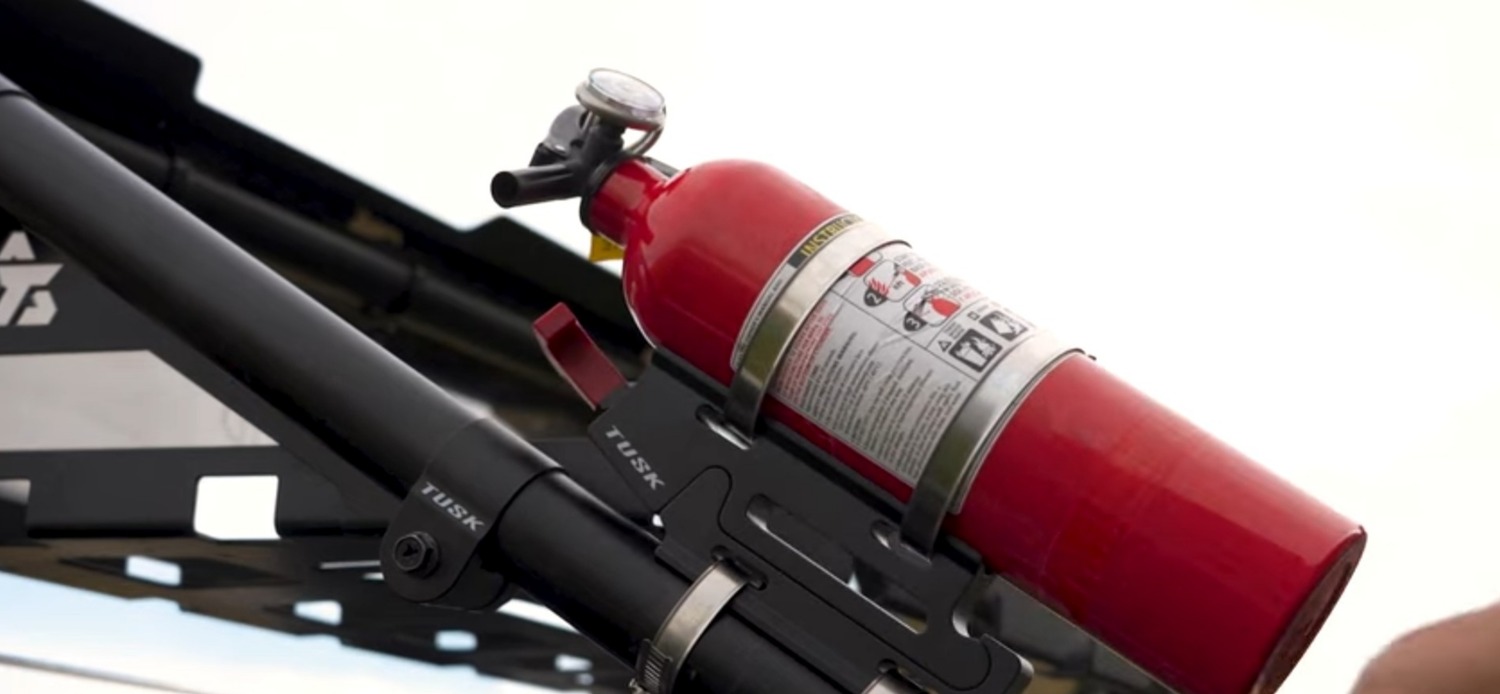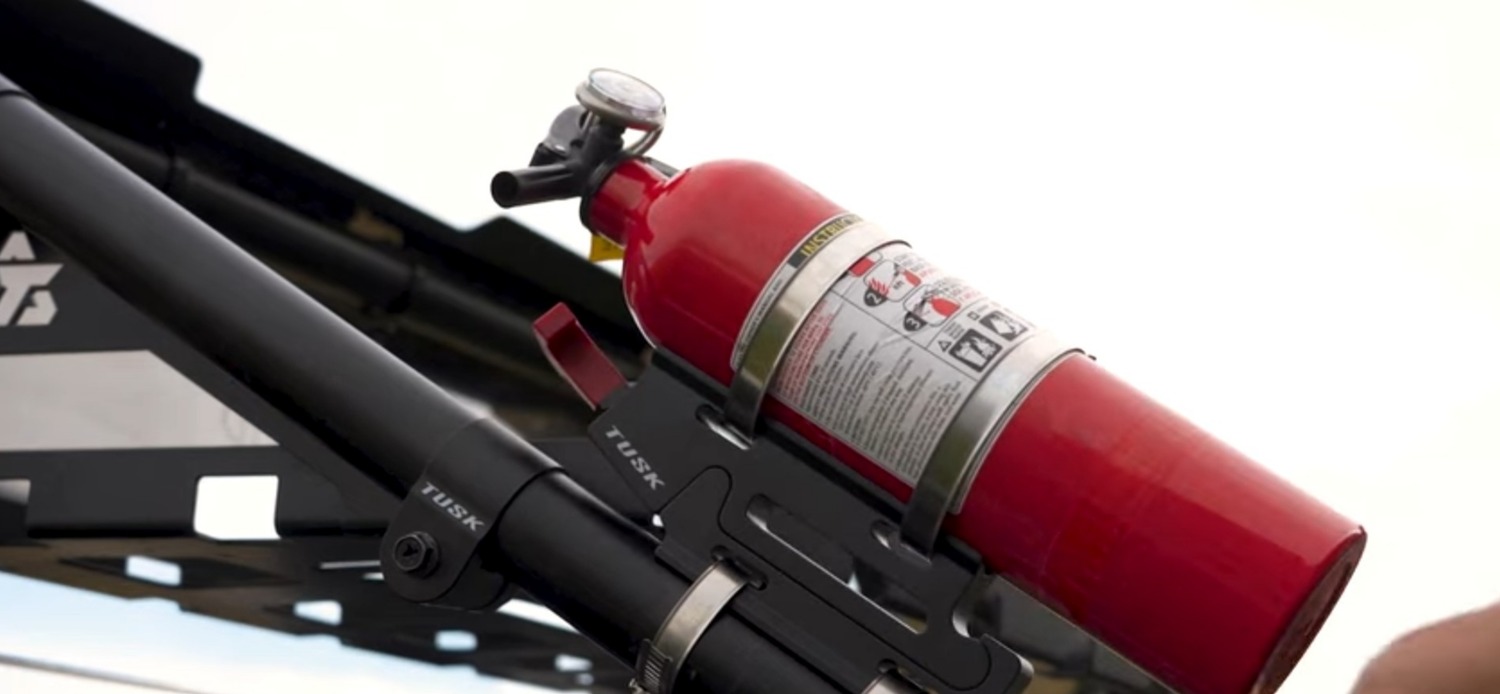As an avid UTV racer and trail enthusiast, I always ensure to have the right fire extinguisher on board.
It’s not just a safety measure; it’s a crucial companion for the unpredictable twists of off-road adventures.
When it comes to off-road adventures and exploring rugged terrains, utility terrain vehicles (UTVs) have become increasingly popular among outdoor enthusiasts.
These multipurpose vehicles deal with exciting experiences & the freedom to navigate inspiring landscapes.
But, like any motor-powered device, UTVs have risks that are related to them. One of these perils includes the possibility that a fire might explode. So What Kind of Fire Extinguisher is for UTV?
I need to have a fire extinguisher with me when racing a UTV. They are crucial, in my opinion, for trail riding as well.
Anything can happen while you’re traveling quickly off-road in the weather. Having fun should be just as important as being ready for a fire, a broken part, or a flat tire.
Here I discuss the key variables to reflect when picking a UTV fire extinguisher.
I will discuss the several sorts of fire extinguishers, their productivity in combating altered fires, and how to choose one for a UTV’s unique environment.
UTV owners and operators must prioritize fire safety. Fires can spread quickly, risking lives and causing substantial damage. That’s why carrying the correct fire extinguisher on board is essential.
Keep reading the article completely to get more information about What Kind of Fire Extinguisher is for UTV?
With the Tusk fire extinguisher mounted securely on my UTV, I navigate through rugged landscapes with confidence, prepared for any fiery encounter.
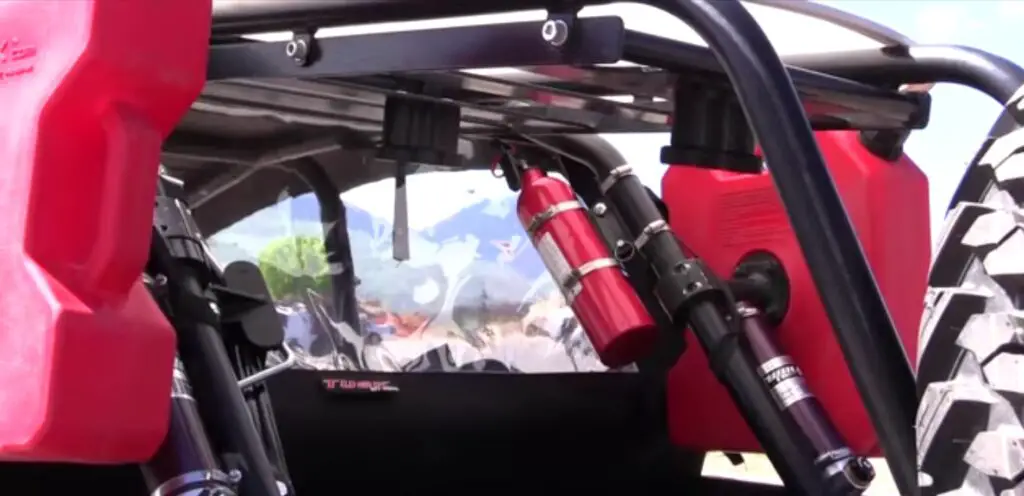
Common Causes of Fires in UTVs So We Need Fire Extinguishers for UTV: UTV Fire Extinguisher
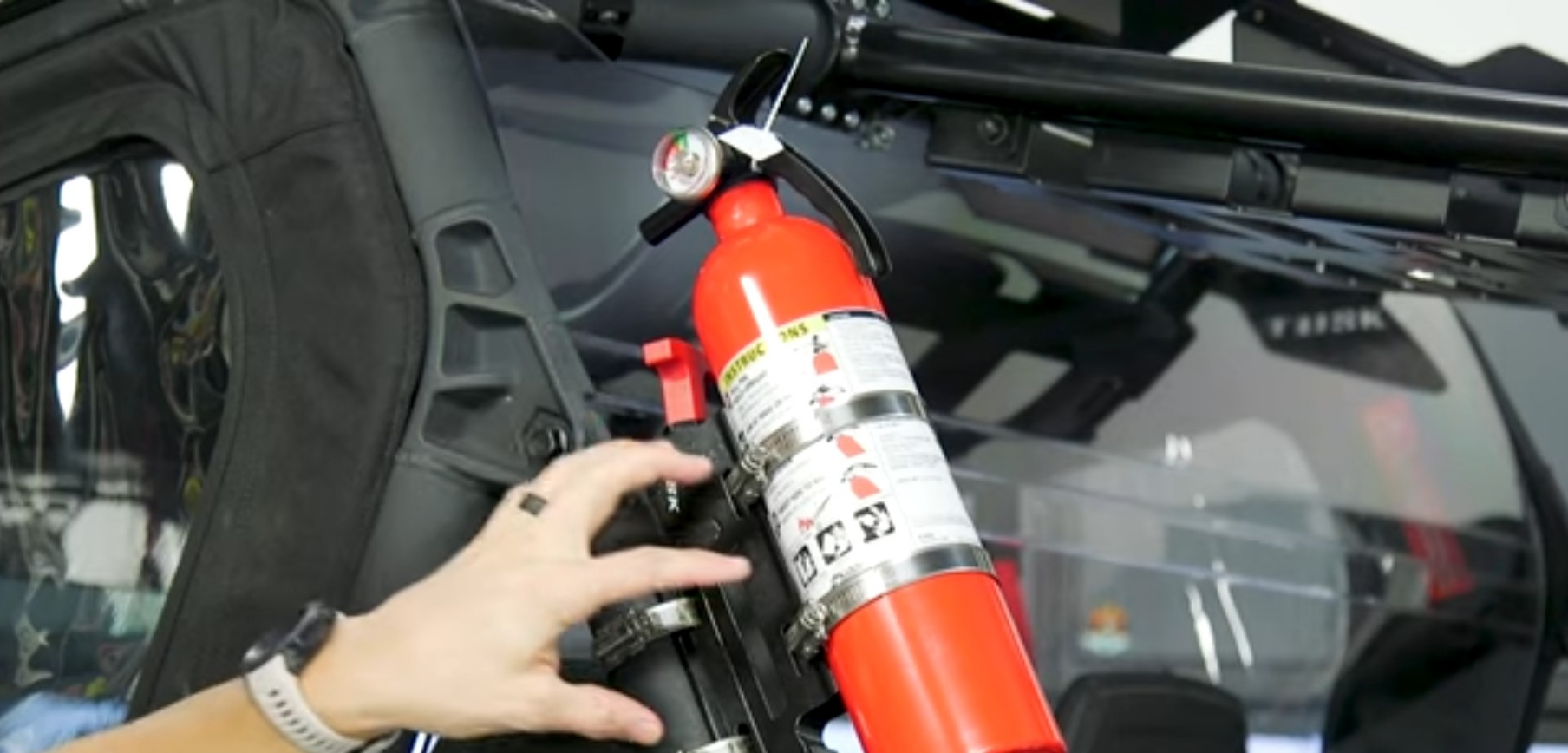
UTVs are versatile off-road vehicles that are frequently utilized for farming, leisure, and various other challenging activities.
Even though UTVs are made to handle rough terrain and work well, they are not completely safe from fire risks.
Understanding the common causes of fires in UTVs is crucial for implementing effective fire safety measures. Here are some of the most common causes:
- Fuel system issues: Fuel leaks can result from UTV fuel system issues such leaking fuel lines, defective fuel injectors, or a broken fuel pump. If leaking fuel touches a hot engine part or an open flame, it can catch fire.
- Electrical system faults: Electrical problems such as broken wires, faulty switches, or loose connections could result in sparks or overheating, which can result in electrical fires. UTVs are often used in dusty, rough places, which can trigger electrical components to wear out faster.
- Overheating: UTV engines generate significant heat during operation. If the cooling system collapses or the vehicle drives at high speeds or under heavy loads for a long time, the engine may overheat. Excessive heat may produce a fire.
- Exhaust system problems: A malfunctioning or damaged exhaust system can emit extremely hot gasses that can ignite dry vegetation or other combustible materials underneath or near the UTV. Also, grass or leaves near the exhaust system might further enhance fire danger.
These causes are not exhaustive, and UTV models and conditions can significantly increase fire danger. UTV fires can be prevented by taking precautions and having fire extinguishers.
Different Types of Fire Extinguishing Agents As Fire Extinguisher is for UTV: Side By Side Fire Extinguisher
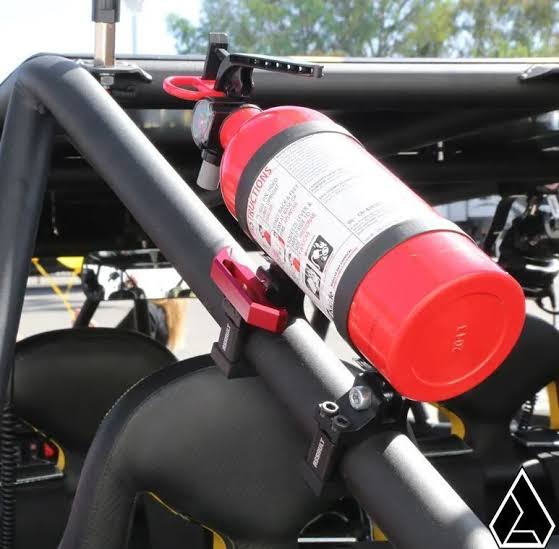
There are various sorts of fire extinguisher agents, each tailored to fight specific fires. The type of fire and materials involved determine the extinguishing agent.
Here is some typical fire-extinguishing agents: What Kind of Fire Extinguisher is for UTV?
Foam: Best UTV And Side By Side Fire Extinguisher
Foam extinguishing agents are effective for flammable liquid fires (Class B fires). When applied, the foam creates a barrier between the fuel and the oxygen, preventing the fire from spreading.
The foam also cools down the fire by absorbing heat, suppressing the flames. It works by smothering the fire and isolating the fuel supply from oxygen.
Carbon Dioxide (CO2): UTV Fire Extinguisher
CO2 gas extinguishes Class B and Class C electrical and flammable liquid fires.
Discharging CO2 reduces oxygen around the fire, smothering the flames. It does not leave residue or damage sensitive equipment, making it suitable for extinguishing fires in areas with valuable assets.
Exploring remote trails in my UTV, I’m grateful for the security my fire extinguisher provides.
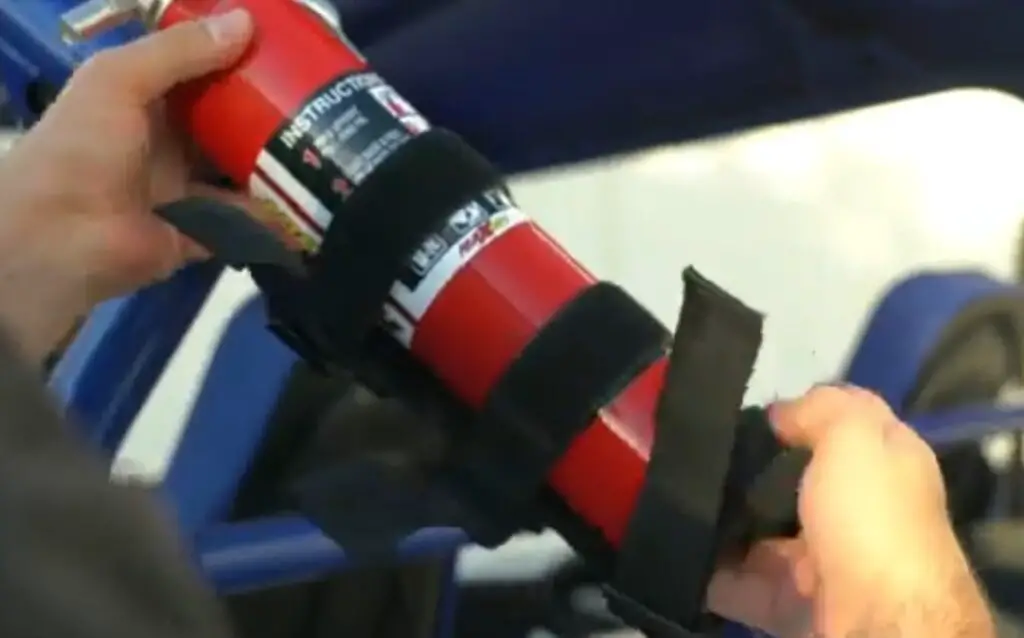
Dry Chemicals: Side By Side Fire Extinguisher
Dry chemical extinguishing agents are versatile and effective for a range of fires (Class B and Class C). They utilize diverse substances, like monoammonium phosphate or sodium bicarbonate, interrupting the combustion process with surprising efficacy.
These agents exhibit a captivating combination of perplexity and burstiness, swiftly disrupting the chemical reactions sustaining the fire.
Halon: Fire Extinguisher For UTV And Side By Side
Halon is a gaseous fire extinguishing agent used for flammable liquid and electrical fires. It functions by interrupting the chemical reaction of the fire.
However, halon has declined in use due to its ozone layer damage. It releases chlorine and bromine atoms that erode the ozone layer.
Consequently, international agreements have restricted its production and phased it out in many applications.
Alternative clean agents, like FM-200 and Novec 1230, have been developed as environmentally friendly substitutes for Halon in fire suppression systems.
Wet Chemicals: Utility Terrain Vehicles Fire Extinguisher
Wet chemical extinguishing agents are specifically designed for kitchen fires involving cooking oils and fats (Class K fires).
They create soapy foam that cools the fire and prevents re-ignition. These substances smother flames by producing a barrier on burning oil.
The foam reduces fire temperature and spreads by absorbing heat.
Wet chemical extinguishing agents are crucial in kitchen environments where grease fires are a common hazard, as they are specifically formulated to tackle these types of fires effectively and safely.
As I push the limits of my UTV’s capabilities, I’m grateful for the peace of mind my fire extinguisher provides, ready for any emergency.
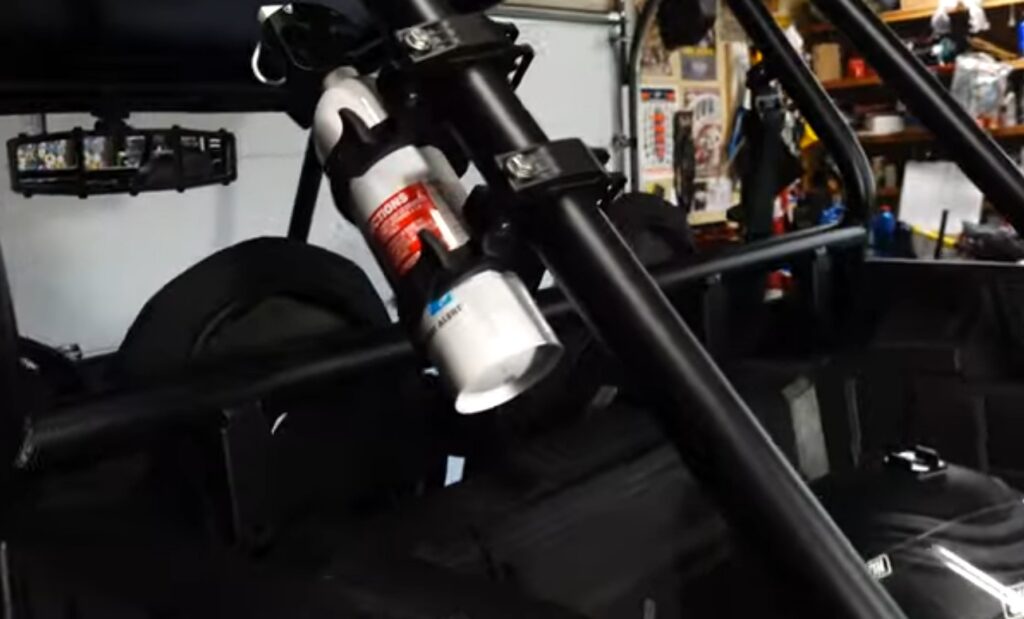
Continue reading to know more about What Kind of Fire Extinguisher is for UTV?
Considerations for Selecting a Fire Extinguisher for UTVs: Fire Extinguisher For UTV And Side By Side
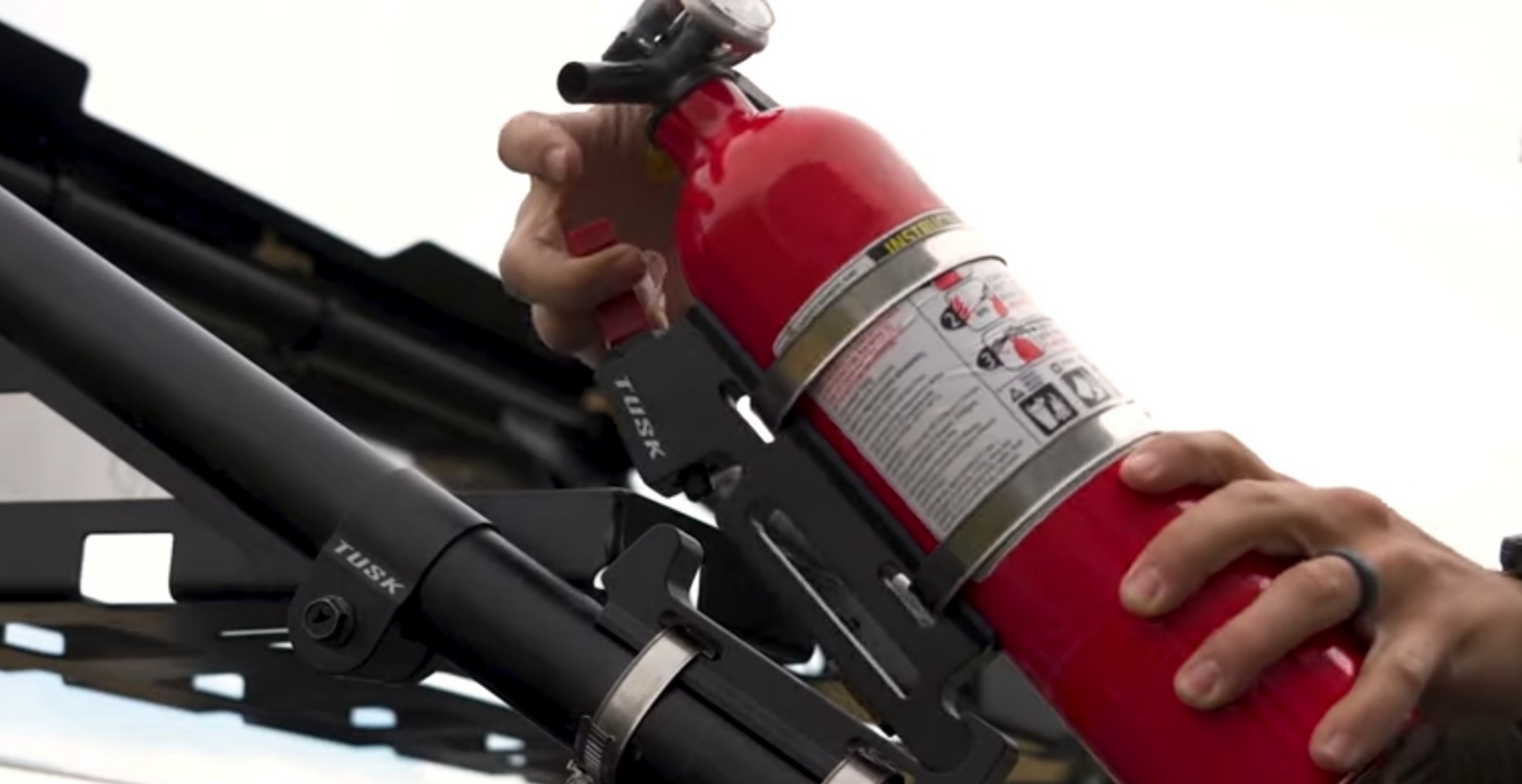
Selecting a suitable fire extinguisher for UTVs (Utility Terrain Vehicles) requires consideration of specific factors to ensure effective fire suppression while accommodating the unique characteristics of these vehicles.
Here are some key considerations for What Kind of Fire Extinguisher is for UTV?
- Size and Weight: UTVs have limited storage space, so choose a compact, lightweight fire extinguisher for simple placement and access.
- Extinguishing Agent: UTVs are frequently advised to use Class A-B-C extinguishers since they can put out a variety of fires, including those involving common combustibles, flammable liquids, and electrical equipment. Multipurpose dry chemical extinguishers are a common option.
- Fire Rating: Higher fire ratings on fire extinguishers are preferable because they signify the extinguisher’s efficiency at putting out fires. In general, higher ratings correspond to greater extinguishing power and longer discharge duration.
- Durability and Vibration Resistance: UTVs are subjected to rough terrains and vibrations, so it’s crucial to select a fire extinguisher built to withstand such conditions. Look for extinguishers designed with robust materials and secure mounting options.
- Mounting and Accessibility: Ensure that the fire extinguisher can be securely mounted in a readily accessible location within the UTV. Consider using specialized brackets or holders that keep the extinguisher firmly in place while allowing for quick and easy retrieval during emergencies.
- Maintenance and Certification: Regular maintenance is essential for fire extinguishers. Select a model that is cool to review, service, & recharge. Moreover, confirm that the extinguisher is certified & compliant with relevant security standards.
- User-Friendly Operation: Choose fire extinguishers with easy-to-understand controls, simple operation, and clear instructions. To ensure a prompt and efficient reaction in an emergency, usability is essential.
Remember, it is essential to familiarize yourself with the selected fire extinguisher’s instructions and receive appropriate training on its proper usage and maintenance.
As I conquer new terrains in my UTV, my fire extinguisher remains a beacon of safety in the wilderness.
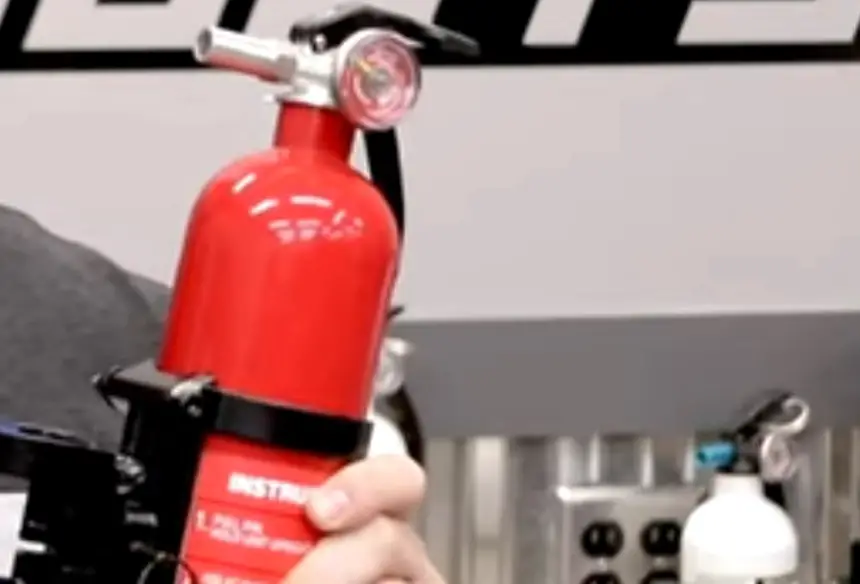
Recommended Options for Fire Extinguisher As Fire Extinguisher is for UTVs: ATV Fire Extinguisher
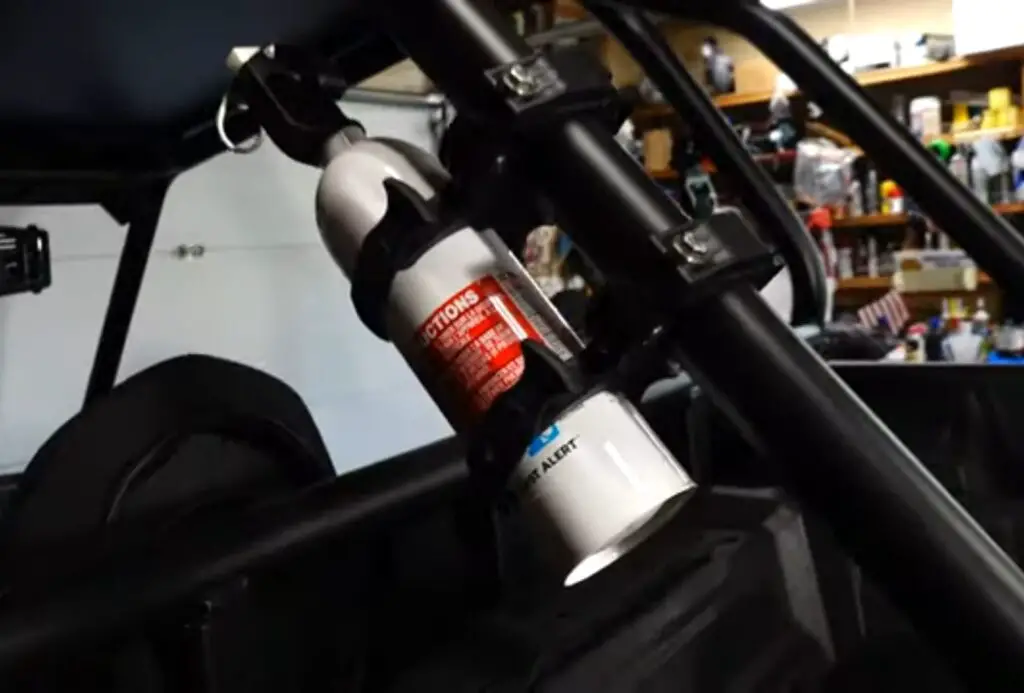
Generally speaking, ABC dry chemical fire extinguishers are advised for usage on UTVs.
Such extinguishers can put out fires ignited by explosive substances, flammable liquids, & electrical equipment.
They are easily accessible, reasonably priced, and they are successful.
Neutral agent’s fire extinguishers, including the FM-200 or Novec 1230, are another option for thought.
These substances are suitable for UTVs with sensitive equipment because they don’t leave any residue and can be used safely on electrical fires.
In light of worries about the environment, halon fire extinguishers are no longer utilized.
Water mist fire extinguishers have a limited range and may not be appropriate for all types of fires.
Finally, choose a fire extinguisher that fulfills safety standards, is suitable for UTV hazards, and follows local rules.
In the heart of nature’s beauty, I find solace in the reliability of my UTV fire extinguisher.
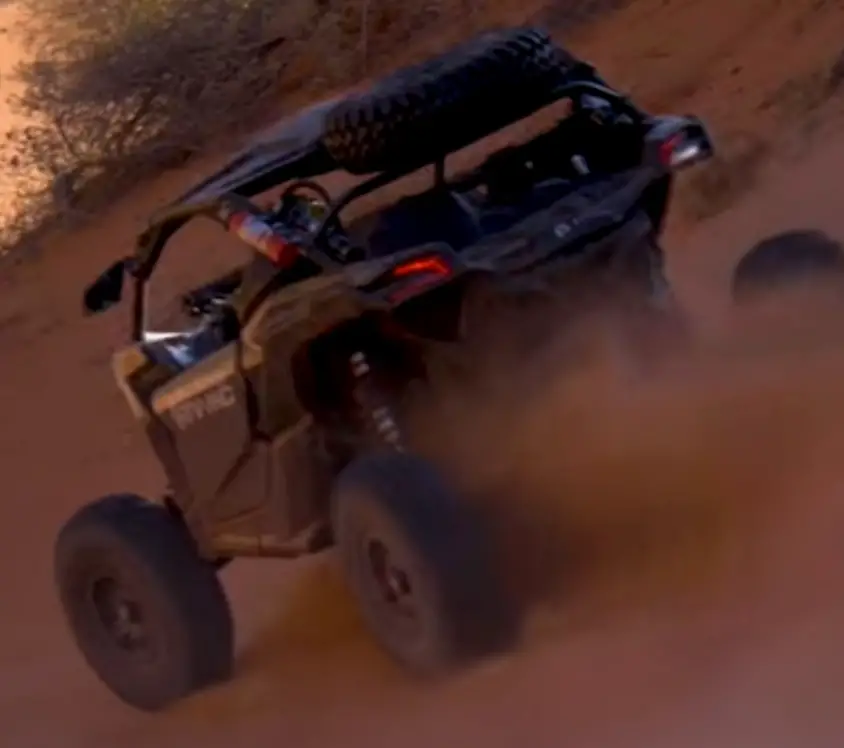
Fire Safety Tips for UTV Owners and Operators When Fire Extinguisher is for UTV: Utility Terrain Vehicles Fire Extinguisher
Fire safety is crucial for UTV (Utility Terrain Vehicle) owners and operators to prevent accidents and effectively handle fire emergencies. Here are some essential fire safety tips:
- Always have a suitable fire extinguisher readily available in your UTV.
- Choose a compact and lightweight fire extinguisher that can be securely mounted within easy reach.
- Ensure the fire extinguisher is appropriate for the types of fires typically encountered in UTVs (ABC dry chemical is a common choice).
- Regularly inspect and maintain the fire extinguisher according to manufacturer guidelines.
- Train yourself and other UTV operators on proper fire extinguisher usage and safety protocols.
- Be cautious when refueling to prevent fuel spills and potential fire hazards.
- Keep flammable materials securely stored and away from ignition sources.
- Avoid driving UTVs through tall, dry grass or vegetation that could easily ignite.
- If a fire occurs, safely move away from the vehicle and call emergency services immediately.
- Stay informed about local fire regulations and follows them to ensure compliance and safety.
Remember, prevention is key, so practicing good fire safety habits and being prepared can help minimize the risk of fire incidents and ensure a safer UTV experience.
I cherish the freedom of UTV exploration, made safer by the presence of my trusty fire extinguisher.
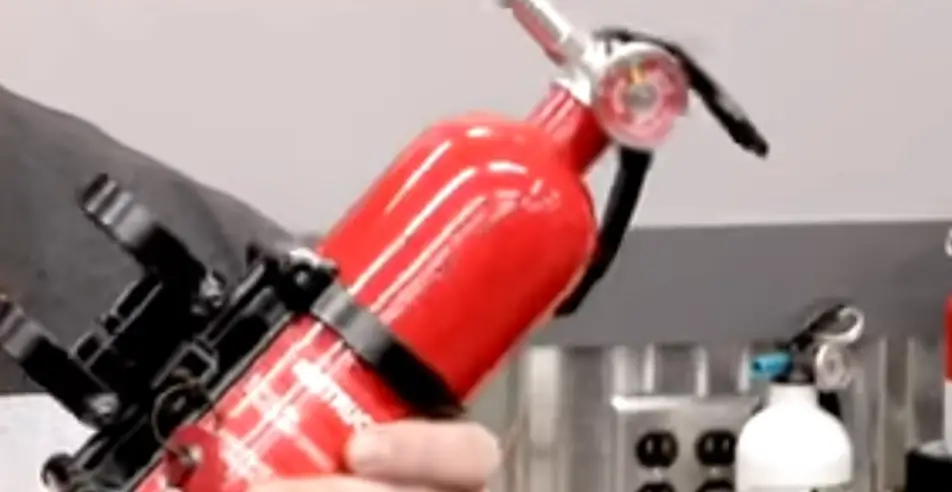
Conclusion
Selecting the right fire extinguisher for your UTV is crucial for ensuring fire safety during your off-road adventures.
The recommended options include ABC dry chemical, halon, clean agent, and water mist extinguishers, each with their advantages and limitations.
By implementing preventive measures, conducting regular maintenance, and following fire safety tips, UTV owners and operators can minimize fire risks and protect themselves and their vehicles from potential hazards.
Prioritizing fire safety is essential for a safe and enjoyable UTV experience.
If I could go back in time, I’d definitely click on this UTV Accident Statistics. It’s the one thing standing between you and possibly wasting thousands on something that doesn’t measure up.
Hope you got all the information about What Kind of Fire Extinguisher is for UTV? Share your personal opinions about What Kind of Fire Extinguisher is for UTV? In the comment box.
FAQs
Go through our FAQs regarding What Kind of Fire Extinguisher is for UTV? To solve any doubts.
Do I need a fire extinguisher on my UTV?
You need to have a fire extinguisher on you when racing a UTV. We also believe that they are crucial for trail riding. Anything can happen while you’re travelling quickly off-road in the weather.
Do I need a rechargeable fire extinguisher?
Infrequently over the course of their lives – Fire extinguishers require periodic recharging.
Is 1kg fire extinguisher enough?
For UTV use, a one kilograms (1kg) dry powder extinguisher is advised. The fire is too big if a 1 kg extinguisher cannot put it out.
Do fire extinguishers expire?
A powder, foam, or water extinguisher typically lasts between 10 and 12 years. This assumes that the extinguisher is undamaged and in good working order. The fire extinguisher needs to be changed after this period of time.
Subscribe for Our Latest Posts! Thank you!
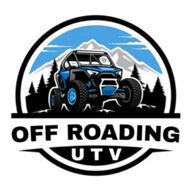 Off Roading UTV Off Roading UTV
Off Roading UTV Off Roading UTV
